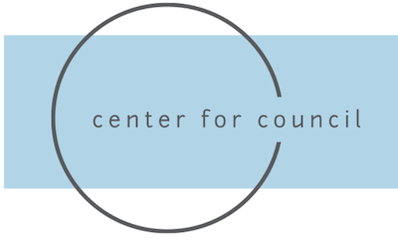 Jared Seide was invited to chat with Jodi Grinwald on her podcast, “Today is the Day Changemakers.” On this podcast, Grinwald shares real stories from real people around the world who are making a difference in their respective communities. Grinwald looks to highlight those who are disrupting the status quo and generating change. In this episode “Beyond Us and Them,” Grinwald and Seide discuss the difference between empathy and compassion, finding balance around empathy and altruism, and Seide’s path to council and how it relates to storytelling and listening. Seide’s own experience as part of the entertainment industry heavily influenced his journey to council and how he perceives the world. He found the shared human stories are the most meaningful in that they make us feel “not alone” and “connected to something bigger.” This led him to council. In their discussion, Seide also talks about the specific difference between council and counsel where counsel and counseling is most often the process of getting advice or guidance from another person. Meanwhile, council stems from the Latin word “concilium” which means a group of people or a meeting which is effectively what it means today. He noted how council can be (and is) applied in a wide variety of settings, such as with health care providers, law enforcement officers, educators, and even within corporations. Seide and Grinwald discussed vulnerability and how many high performing groups actually encourage and protect vulnerability and create spaces where it is celebrated. Seide notes that “vulnerability leads to trust” and not the other way around which is how many often assume it works. In council, one does not need to share their “deepest darkest secrets;” it can be something as simple as “a thing that used to scare you or a time you lost something.” Sharing stories where you showcase your authentic self helps create a positive, creative, and productive culture and environment. They went on to talk about judgement and how the assumption that judgment is the norm perpetuates this idea of us and them. Judgment leads to us seeing a threat in many cases where we could instead take a breath and bring ourselves to a place of understanding and learning instead. As we look towards the future, Seide sees the ability to go beyond us and them by truly taking the time to understand and converse with those we disagree with as a key step in creating healthier and more connected communities. They dove into the book, Where Compassion Begins. The latter half of the book consists of assignments that help you develop more mindfulness and provides guidance on how to set up opportunities for council on your own. Learning by doing is key! Sitting down and actually taking part in council is one of the main ways of learning how to effectively participate in council. As a final question, Grinwald asked if Seide had any advice for young changemakers; Seide noted the value of “not knowing” and being able to arrive in a situation without biases so you can be “truly present” in any given situation. Change begins within yourself and setting aside our preconceived notions is an irreplaceable part of problem solving. Lastly, he noted that compassion begins with oneself. For more information on council and how to effectively begin this practice, we offer opportunities to participate through our Social Connection Councils which happen every few weeks. For those interested, you can also find links and more information about Where Compassion Begins here on our website. Listen to the podcast on Apple Spotify Youtube or wherever you tune in.
0 Comments
“Given the profound consequences of loneliness and isolation, we have an opportunity, and an obligation, to make the same investments in addressing social connection that we have made in addressing tobacco use, obesity, and the addiction crisis.” - Dr. Vivek Murthy, 19th and 21st Surgeon General of the United States
June 12th-18th is Global Loneliness Awareness Week (GLAW), an annual campaign to bring international awareness to the crisis of social isolation and loneliness. Since the Marmalade Trust (a leading loneliness Charity in the United Kingdom) started GLAW in 2017, it has gained momentum both in the UK and internationally. Unsurprisingly, loneliness is something that most of us will experience at some point of our lives. Despite this, the consequences of prolonged or consistent feelings of loneliness or isolation are unfortunately often overlooked. Loneliness takes many different forms and can be caused by a number of different factors or catalysts. For example, specific life events, workplace situations, and a sense of disconnect from people in your life can all contribute to a feeling of loneliness. Beyond this, more often than not, you won’t know if someone else is lonely unless they express that. In 2018, BBC’s Loneliness Experiment revealed that the stereotype of older individuals being the loneliest was simply false; instead, 16 to 24-year-olds reported the highest levels of loneliness. With that said, every age range exhibited a significant proportion of individuals who regularly experienced loneliness. Today, loneliness in the United States has been classified a public health crisis both due to its widespread nature and the litany of adverse consequences stemming from it. Dr. Vivek Murthy, the current surgeon general, noted that recent studies reveal that one-in-two adults in America reported experiencing loneliness in his recent advisory. Beyond that, loneliness and social isolation can significantly affect your health as it can contribute to cognitive decline, heart disease, anxiety, depression, and many more health challenges. Fortunately, loneliness is very fixable and anyone can take immediate steps to feel better. Telling others how you feel, thinking about your own emotional and social needs, and making plans to start building those social connections are all great steps in combating loneliness. You can read the national advisory here. In his advisory, Dr. Murthy listed several strategies including participating in social and community groups, minimizing distractions during conversations, and actively engaging with people of different backgrounds and experiences. Here at the Center for Council, we offer Social Connection Councils (SCCs) where you get the opportunity to learn the basics of council, listen to each other without judgment, and speak from the heart. Previous participants report feeling more connected, grounded, and calm; moreover, they note how authentic and mindful the discussions were. These are just one of many different opportunities for all of us to work on combating this now widespread epidemic of loneliness. With loneliness becoming more and more relevant, it is now more important than others that we prioritize human connections. Be it through SCCs or other methods, there are many different ways that we can all prioritize our own and our community’s well being by committing to reconnecting with others. Fortunately, making connections with others is perhaps the most human skill. You can read the national advisory here. And register for a SCC here. Jared Seide, Executive Director, attends the DOJ National Officer Safety & Wellness Working Group6/5/2023  Our Executive Director, Jared Seide, recently attended the National Officer Safety & Wellness Working Group in Washington, D.C., hosted by the US Department of Justice and Bureau of Justice Administration. The conference brought together law enforcement officials, mental health experts, and other professionals to discuss the challenges facing police officers and the importance of promoting officer safety and wellness. The working group focused on a range of issues related to officer safety and wellness, including stress management, mental health, and building community trust. Participants also discussed best practices for promoting officer safety and wellness, such as training programs, peer support networks, and policies to address mental health and substance abuse issues. Seide was invited to participate in the convening to share his expertise bringing programming to police officers to support self-awareness, resilience and compassion.He emphasized the importance of providing police officers with the tools and training they need to better manage stress, build resilience, and develop compassionate connections with their colleagues and their communities. Seide shared details on Center for Council's POWER Training Program, which provides police officers with the skills and resources they need to better manage the stresses of their job and build more meaningful relationships with the people they serve. Through the POWER program, police officers are taught how to communicate more effectively with each other and with the community, as well as how to manage their emotions and cope with the challenging situations they encounter on a daily basis. Seide emphasized the importance of this type of training, stating that police officers are often exposed to traumatic events that can have a lasting impact on their mental health and well-being. By teaching police officers how to develop resilience and compassion, POWER is helping to address these issues and promote the overall well-being of police officers. The POWER program has been implemented in agencies across the country and the results have been promising. Officers who have completed the program report feeling more connected to their communities, more resilient, and better equipped to cope with the stresses and traumas they encounter on the job. Seide's participation in the National Officer Safety & Wellness Working Group highlights the importance of promoting officer safety and wellness, and the critical role that programs like POWER can play in achieving this goal. By providing police officers with the tools and training they need to better manage stress, develop resilience, and build compassionate connections with their communities, we can help create a safer and more compassionate society for all. Read more about POWER here: https://www.centerforcouncil.org/power-training.html |
Categories
All
Archives
March 2024
|
|
|
About |
|






 RSS Feed
RSS Feed
